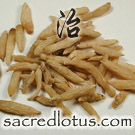Mai Men Dong (Ophiopogon Tuber)
Herb 7 of 15 in Herbs that Tonify Yin
Buy This Herb
Get free shipping from
our partners at CHD
our partners at CHD
Chinese Herb Actions
-
Moistens the Lungs, Nourishes Yin
Treats cases with damaged Lung Yin including symptoms of a hacking, dry cough, or hemoptysis, dry throat, dry mouth, dry cough with scanty and difficult to expectorate phlegm. Also for dyspnea, chest fullness and pain with a dry cough. Most often used in cases when a Warm-Dry pathogen has transformed into fire because it can cool the lungs. - Nourishes the Stomach Yin and Generates Fluids
For thirst and dry mouth due to insufficient Stomach Yin. Also for Xiao Ke syndrome(wasting and thirsting disorder). - Moistens Intestines
For intestinal dryness and constipation due to Yin Deficiency leading to dryness - Clears the Heart and Eliminates Irritability
For irritability, especially fever and irritability that worsen at night due to Yin Deficiency or Heat Pathogen in the Ying Level
Chinese Herb Contraindications & Cautions
- Do not use in cases of diarrhea from Cold and Middle Jiao Deficiency
- Do not use in cases of cough due to Wind-Cold or Damp-Phlegm
- Avoid use prior to operating heavy machinery due to possible drowsiness associated with use of this herb
Herb-Drug Interactions
- None Noted.
Chinese Herb Toxicity & Overdose
- No toxicity noted
- Possible allergic reactions include nausea, vomiting, nervousness, agitation, tingling abdominal pain, and pruritus along with delirium and loss of consiousness.
- Section not completed...
Chinese Herb Dosage
- 10-15 grams in decoction, crushed 12
- 6-15 grams in decoction 13
This Herb Appears in the Following Formulas:
- Bai He Gu Jin Tang (Lily Bulb Decoction to Preserve the Metal)
Category: Formulas that Enrich the Yin and Moisten Dryness - Cong Bai Qi Wei Yin (Scallion Decoction with Seven Ingredients)
Category: Formulas that Release Exterior Disorders with Interior Deficiency - Da Ding Feng Zhu (Major Arrest Wind Pearl)
Category: Formulas that Extinguish Internal Wind - Da Zao Wan (Great Creation Pill)
Category: Formulas that Nourish and Tonify the Yin - Di Huang Yin Zi (Rehmannia Decoction)
Category: Formulas that Extinguish Internal Wind - Ding Xian Wan (Arrest Seizures Pill)
Category: Formulas that Transform Phlegm and Extinguish Wind - Mai Men Dong Tang (Ophiopogonis Decoction)
Category: Formulas that Enrich the Yin and Moisten Dryness - Qing Shu Yi Qi Tang (Clear Summerheat and Augment the Qi Decoction)
Category: Formulas that Relieve Summerheat - Qing Ying Tang (Clear the Nutritive Level Decoction)
Category: Formulas that Clear Heat from the Nutritive Level and Cool the Blood - Qing Zao Jiu Fei Tang (Eliminate Dryness and Rescue the Lungs Decoction)
Category: Formulas that Gently Disperse and Moisten Dryness - San Jia Fu Mai Tang (Three Shell Decoction to Restore the Pulse)
Category: Formulas that Extinguish Internal Wind - Sheng Mai San (Generate the Pulse Powder)
Category: Formulas that Tonify the Qi - Sheng Tie Luo Yin (Iron Filings Decoction)
Category: Formulas that Sedate and Calm the Spirit - Tian Wang Bu Xin Dan (Emperor of Heaven's Special Pill to Tonify the Heart)
Category: Formulas that Nourish the Heart and Calm the Spirit - Wen Jing Tang (Warm the Menses Decoction)
Category: Formulas that Warm the Menses and Dispel Blood Stasis - Yang Yin Qing Fei Tang (Nourish the Yin and Clear the Lungs Decoction)
Category: Formulas that Enrich the Yin and Moisten Dryness - Yi Guan Jian (Linking Decoction)
Category: Formulas that Nourish and Tonify the Yin - Yu Nu Jian (Jade Woman Decoction)
Category: Formulas that Clear Heat from the Organs - Zeng Ye Tang (Increase the Fluids Decoction)
Category: Formulas that Enrich the Yin and Moisten Dryness - Zhi Gan Cao Tang (Honey Fried Licorice Decoction)
Category: Formulas that Tonify the Qi and Blood - Zhu Ye Shi Gao Tang (Lophatherus and Gypsum Decoction)
Category: Formulas that Clear Heat from the Qi Level






